文:白雲詩社 元曦
創世既久,歲月既深。末劫將至,神洲陸沉。
紅潮橫溢,世人不仁。漫天是眼,佛道諸神。
層層曠宇,蕩蕩天門。萬古終開,轉大法輪。
洪聲徹宇,穿越恆古。法徒踐約,重塑金身。
風馳雷動,赤龍立斬。靈旗所向,掃除舊塵。
大夢有終,沙劫有盡。眾生醒覺,倆倆歸真。
法光無際,花雨繽紛。普天同慶,同頌師恩。
三字真言,道德之根。大穹永固,兆劫長春。
寫于己亥年法輪大法日 (20190513)

文:白雲詩社 元曦
創世既久,歲月既深。末劫將至,神洲陸沉。
紅潮橫溢,世人不仁。漫天是眼,佛道諸神。
層層曠宇,蕩蕩天門。萬古終開,轉大法輪。
洪聲徹宇,穿越恆古。法徒踐約,重塑金身。
風馳雷動,赤龍立斬。靈旗所向,掃除舊塵。
大夢有終,沙劫有盡。眾生醒覺,倆倆歸真。
法光無際,花雨繽紛。普天同慶,同頌師恩。
三字真言,道德之根。大穹永固,兆劫長春。
寫于己亥年法輪大法日 (20190513)

上篇《曾錚學英文心得:必殺技只兩招》發表後,收到許多反饋,朋友們紛紛參與討論,分享各自心得。受大家討論的啓發,我覺得應該再寫個續篇,因爲上篇中有些話其實沒能說透,所以今天再從下面這幾個方面說一說。
一、關於「聽力通道」
上篇我提到自己從一句英文都聽不懂,到堅持抱著收音機狂聽半年後,突然就全部聽懂了,感覺上,似乎就是有個「聽力通道」被打開了,而這個通道跟你是否認識這個字根本沒關係。
我覺得中國的英語教學是非常失敗的,至少在我當年上中學時是這樣,教出來的學生很多都只會「啞巴英文」,會看、會寫,但不會聽、不會說。
我有個「文盲」親戚,他學英文的過程和他的英文能力跟中國學校出來的學生剛好相反。他只會聽說,不認識英文字,當然就更不會寫了。怎麼會這樣呢?
原來,這位親戚在日本呆了近十年,日文說得很溜,英文卻一句不會。後來他跟太太一起從日本到澳大利亞創業,開了一家養老院,爲了省錢不能僱太多人,所以很多事情必須親力親爲,包括跟養老院裏那些只講英文的老人們直接溝通。
這位親戚應該說語言能力是很強的,因爲有這個工作及生意需要,他愣是沒多久就能與老人們作基本的溝通了。但拿出英文材料,他完全是文盲,根本看不懂,開車出門連路牌上簡單的路名都不認識,全靠看阿拉伯數字的公路編號來認路(那時還沒有GPS)。
我2001年因修煉法輪功受迫害,從中國逃到澳洲時,就住在他家,目睹了他這種我前所未見的學英文方法。
他的經歷讓我更加確信,聽和看完全是兩種不同的能力,在大腦中走的是不同的「通道」。
「聽力通道」這個說法是我發明的,也不知是否有科學依據,但感覺上,它確實是存在的。
因此,想聽懂英文的朋友,必須將這個通道打開。否則,再認識多少單詞,也是個「聾子」兼「啞巴」,正如我那位親戚是個「文盲」一樣。
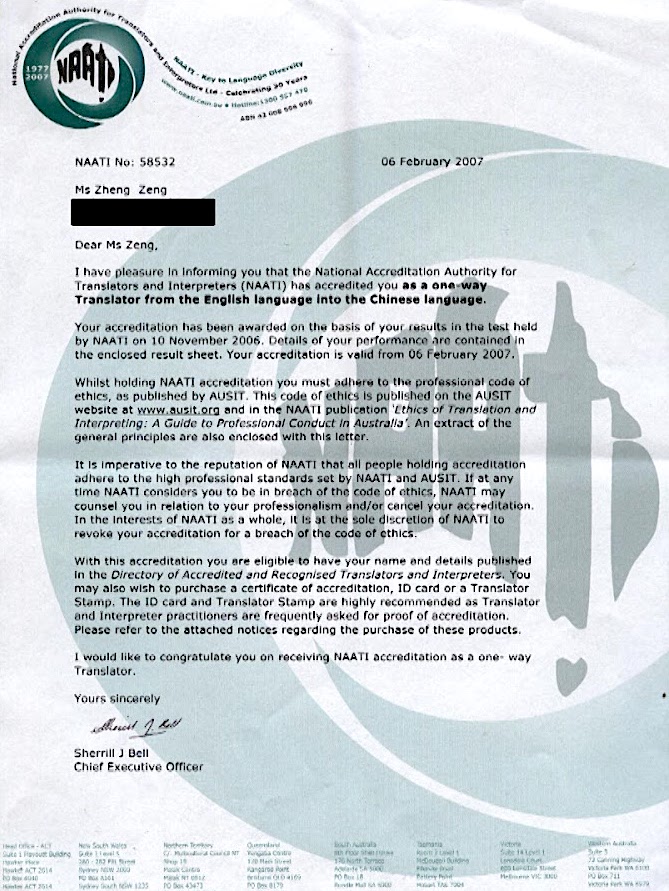
曾錚的三級翻譯資格認證信,終身有效。這是英翻中的(from the English language into the Chinese language)。
二、關於直接用英文思考
我覺得英文要想再上臺階,做到直接用英文思考是很重要的,這與掌握多少詞彙量也沒有關係,而是一種可以訓練出來的習慣。
比如,我們在看到「書」這個中文字時,腦子中會出來書的形像,和與書相關聯的所有內涵,會理解到「書」是什麼。
同樣道理,如果你看到英文的「book」這個詞,你不要先把它翻譯成「書」,而是直接想這是「book」,腦中直接聯想出「book」的形像和內涵,哪怕就是這一個詞,你也能練習用英文直接思考。
我上研究生時學過一年俄語,是從字母開始,在一個單詞也不會的基礎上開始的。但那時英文已有一定基礎,已經掌握了直接用英文思考的方法,因此我學俄語時,一上來就直接用俄語思維,就算只會很簡單的幾句話,在念到、想到這幾句話時也是直接用俄語在想、在理解。
我不知是否因爲這個原因,總之有一次我讀完課文後,老師大爲吃驚,要求所有同學爲我鼓掌,說我讀得太好了。其實那時會的東西非常非常有限,學了一年下來,大約有小學生三、四年級的水平吧。
總之,我個人認爲,真想讓自己的英文能力再上臺階,養成用英文思考的習慣是很必要的。不然,中間總隔著一個中文翻譯過程的話,講出來、寫出來的英文不會很地道吧!理解起來也總是多一個步驟,聽人講話時,怎麼能跟上呢?
三、關於基本積累及詞彙量
我上篇文章中說,自己從買第一個練聽力的收音機,到現在已三十多年了,仍然堅持每天一起牀就聽英文。後來仔細想想,這個說法其實不準確。
準確的是,從1991年研究生畢業開始工作以來,事實上基本用不到英文,92年生小孩後,健康完全垮了,保命要緊了,哪還顧得上學英文?後來雖然因煉法輪功撿回了這條命,但英文也沒有再撿起來,因爲用不到了嘛。
也就是說,從1991年畢業,到2001年逃到澳洲,我有十年完全沒碰過英文。
但是,2001年當我決定出國寫書揭露迫害,開始從學英文《轉法輪》開始,再把十年不用的英文撿回來時,我發現非常輕鬆。十年沒用,但好像根本沒忘。
相反,我的俄語當時學得也很好,但現在卻連字母都認不全了,忘得光光的。
爲什麼會這樣呢?我個人覺得,這是因爲學一門外語,有一個基本的「門檻」要過,有一個基本的積累。對英文來講,也許這個基本積累是詞彙量上萬、「聽力通道」打開這兩條。
有了基本積累,就是過了一個門檻,一時不用不練也不會忘,以後再學再練,就是上另一個臺階的問題了。
這有點像登山,如果你沒能上到那個峯頂,就看不到風光,而永遠只感到爬山好累。有時其實差一點就到頂了,或者說,就過了那個基本的「門檻」了,但因爲看不見前景,就放棄了,結果嗤溜溜又從原路滑到山底,下次想學還得重來。
所以呢,真想學的,一定要想辦法過了那個「檻」,登上那個頂。到了那裏後,就能嚐到甜頭了,千萬不要半途而廢。
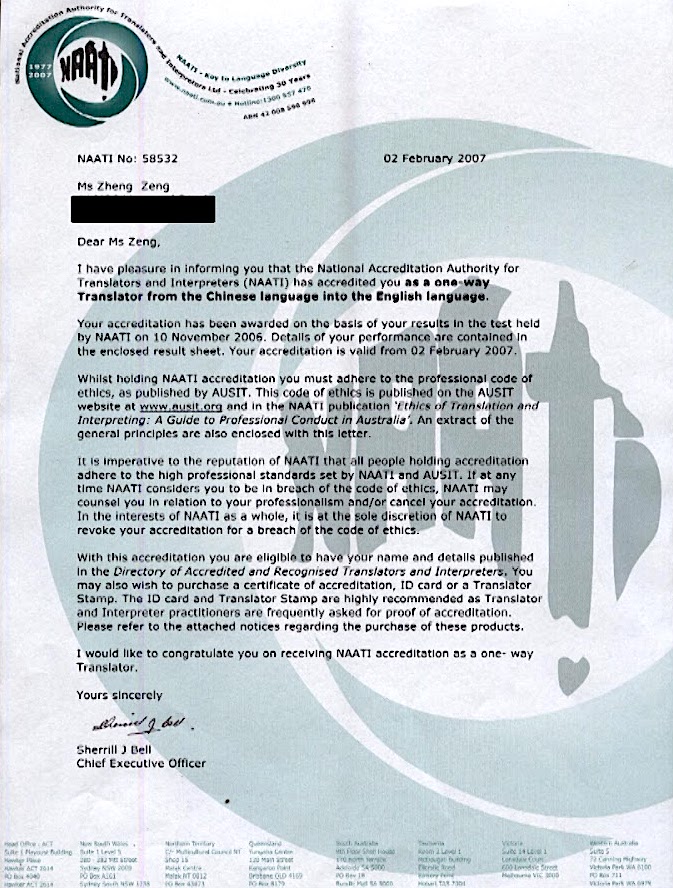
曾錚的三級翻譯資格認證信,終身有效。這是中翻英的(from the Chinese language into the English language)。
四、怎樣積累詞彙量?
我在上篇講過,北大英文「尖子班」,事實上一共開了四門課:「精讀」、「速讀」、「聽說」和「寫作」,分別由四個不同的老師教。
基本上,「精讀課」是學北大自己編的教材,是傳統意義上的一篇一篇的課文,「精讀」就是要求每個字都要讀明白,完全理解這篇課文講什麼。
「速讀」恰恰相反,只要求速度和數量,不要求你個個字都搞懂,甚至讓你遇到不認識的字就跳過去,或者自己瞎蒙,不要查字典,因爲一查字典絕對就影響速度了,或者太累了,搞到你自己不想看了。
我覺得對於詞彙量還沒有達到一萬的朋友,可以考慮採取這種「精讀」與「速讀」結合的方法。每天選一篇短文,哪怕只一小段,來精讀一下,把它的每個字都查明白(建議用英英詞典查,且養成直接用英文思考和理解的習慣),要完全搞明白這段英文講的是什麼。
與此同時,根據自己的時間再做一些「不求甚解」、不查字典的「速讀」,能讀多快不要緊,關鍵是要讀得多。爲使自己能讀得下去,最好找自己愛看的東西。比如我當年就是看有故事情節的、我本來就很愛看的文學名著。
這種閱讀,對於擴大詞彙及積累,找到英文的語感,也是非常重要的。我們學中文,不也是這麼學過來的嗎?
五、關於「天下沒有免費的午餐」
對於「天下沒有免費的午餐」這句比較「文雅」的話,河南人有個更形像的表達:「只看見賊吃嘴,沒看見賊挨打」,意思都是一樣的,你要想得到,必須要付出,連當賊都如此。
我看見許多朋友說想學好英文,但是,真正下功夫的人,坦率說,不是很多。
我上篇分享了一點點自己在英文方面的「成就」,和所下的一點點功夫,今天再多分享一些吧,以便「敲打敲打」那些想「不勞而獲」的年輕朋友們。
我記得進大學沒多久,就有一個學姐到我們宿舍來說,以後,你們要花一半的時間在英文上,其他所有專業課,加起來花一半時間就行了。因爲到最後,大家的專業課水平都差不了多少,要拉開差距,就看英文了。
我這人向來比較聽話,雖然從未打算出國(請見拙文《三十年愛國夢斷》),但不知怎麼這句話我就聽進去了,加之第一次英文中考只得了七十多分的「奇恥大辱」,我真的是將課外的一半時間全部用在了學英文上。
自從「悟」到要像學母語那樣學英文之後,我開始借英文文學名著來看,每天午飯後至少半小時,雷打不動,另再找其他零碎時間看。
那時還不是電子時代,圖書館的藏書都是一本本的實體書,擺在書架上的,因此借書前,必須先查書號,填寫借書單,圖書館的工作人員才能按「單」索驥,在「浩如煙海」的書庫中把你要借的書給你找出來。
查書號是用卡片查的,卡片是按字母排序的,必須得知道書名,或作者名,才能找到相應的卡片檢索。我那時知道的作家名和書名都很有限,也沒有谷歌可以給你搜一把,沒辦法,就只能把知道的這些作家所有的書都統統看過去。
曾錚的專業翻譯章。
比如,寫《艱難時世》(Hard Times) 的狄更斯(Charles Dickens)、寫《德伯家的苔絲》(Tess of the d’Urbervilles)的哈代(Thomas Hardy)、寫《飄》(Gone with the Wind)的米切爾(Margaret Mitchell)、寫《簡愛》(Jane Eyre)和《呼嘯山莊》(Wuthering Heights)的勃朗特三姊妹(Anne, Emily, and Charlotte Brontë),等等這些人的所有著作,我全部都看完了。連米切爾最早期寫過的一本不爲人知的驚悚小說,我也膽顫心驚地看完了。
看到後來沒得看了,不知道更多作者和書名,也不知道再怎麼查到更多的書來看。有一次在一個剛剛被英文系用過的教室裏,看到黑板上寫著,要求大家去借「The Portrait of a Lady」,我如獲至寶,趕緊抄下書名(到今天還記得!),再按這書名「索驥」,又打開一個新的閱讀天地。
那個閱讀量,可真不是開玩笑啊。特別是《艱難時世》和《大衛‧科波菲爾》(David Copperfield)這兩本書,那叫一個厚啊,能當枕頭用了。讀完這兩本書,再讀什麼《悲慘世界》和《簡愛》之類的,都覺得是小兒科啊。
後來在澳洲出英文書時,無意中跟我的西人編輯聊到我讀過的一些英文名著,她驚歎道:「你讀的書比我都多!」
還有一件當「釘子戶」的事,也很有意思。
北大本科生的英文課,只開兩年,到大學三年級,英文課就停了,讓大家從此後「自學成材」。
一說不上英文課了,我有些慌,後來不知怎麼聽說學校有給博士生請外教,開小灶,專門練習口語,便上天入地打聽到上課的時間地點,早早便坐到人家教室裏去「蹭課」。
後來「蹭課」的人多了,小教室裏坐不下,博士生們不幹了,開始抗議。外教挺有意思,說作爲老師,他是學生越多越高興,這事他不管,讓我們自己解決,並真的走出教室,讓學生們自行「幹架」。「幹架」結果,當然是「蹭課」一個個被攆走。
但是……有一個例外,那就是我。我他們始終攆不走,後來就剩我一個了,也影響不了他們太多,他們也就放棄了,後來還跟我成了朋友,老師也很喜歡我。於是我這個「蹭課」釘子戶,就這麼又愣是蹭了整一年。
也就是說,不是我比別人聰明,真的是傻呵呵下了很多功夫的啊。
不過呢,因爲我所謂的「下功夫」,大多是看我本來就愛看的文學名著,倒不覺得苦。這篇心得的標題裏寫「苦功」,其實是不對的,應該寫成「樂功」。但「樂功」怕沒人理解,所以馬馬虎虎還是放個「苦功」在那裏。
今天學英文條件應該很好了啊,不僅可以看小說,還可以找好萊塢大片來看啊,既欣賞了電影,也練了聽力。總之太苦的事如果幹不下去,那就儘量找能「樂在其中」的方式來做。
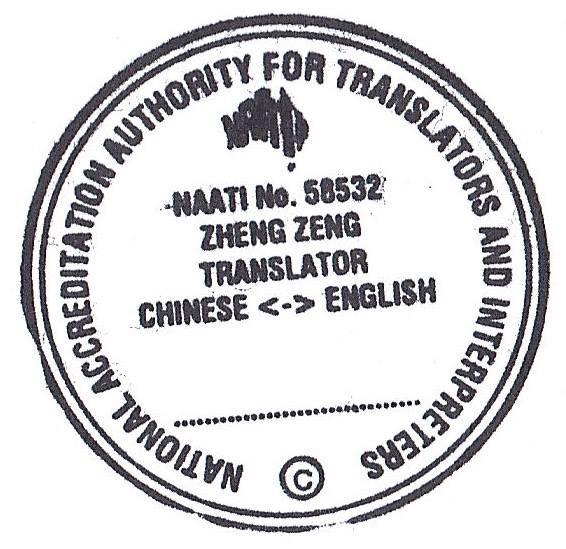
曾錚的專業翻譯章。
六、語言威力無窮 值得下「樂功」
語言,我想,是神給人的最有威力的東西之一。往大了說,覺者聖賢傳法講道度人,授業解惑,要靠語言;往小了說,在人的層面,它可以改變一個人的命運,或事業及人生前途。
以我個人爲例吧,我2000年10月在北京女子勞教所目睹和經歷了比希特勒法西斯集中營中還要殘酷的中共迫害法輪功的驚天罪行,並下決心要活下來、逃出來寫書揭露黑幕時,其實是兩眼一摸黑的。怎麼實現這目標,完全不知道。
2001年4月死裏逃生出來後,我既無護照,又無工作,更沒有簽證,還要躲警察。怎麼出國啊?
這時,我就想,得找「老外」幫忙。不管中共怎麼宣揚「資本主義」的罪惡,我通過學習英文,對於像《飄》裏面韓媚蘭(Melanie Hamilton)那樣善良虔誠的基督徒,是無限神往的,同時很自然地覺得跟西方社會、西方文明和西方人是相通的,能夠融爲一體的。
於是我就尋找各種機會接觸老外,幫他們當翻譯,再尋找合適的時機和人選講我的故事、我的危險緊急的處境,並請他們幫忙。
我大約一共就講了三撥人,結果兩撥願意幫忙,一撥是從澳洲去中國教英語的基督教夫婦,他們很快給我發了去澳洲做商務考察的邀請函。
另一位是帶著一幫學生到中國進行暑期交換項目的美國亞利桑那大學的教授。她回美國後,雖然正值學校放假,也一家一家去敲開相關人員的門,先是說通學校給我一個中文助教的工作職位,再是說通各部門工作人員在最短的時間內把邀請函給我發出來。這些統統都是在假期做完的,那得多不容易啊?
因爲澳洲的邀請信先到,我就快馬加鞭辦了澳洲簽證。我到達澳洲的第二天,美國的邀請函也到了。
也就是說,我2001年4月4號才離開勞教所,四個多月以後的8月31號就拿到簽證「遠走高飛」,9月1號還得到一份「多餘」的沒用上的來自美國亞利桑那大學的助教工作職位……
這些,都全靠著我會說英文,能把事情講明白,能讓「外國友人」感到急迫性,尤其那位教授,她真是「逼迫」著學校在假期爲我辦好了一切的啊。
這算不算改變了命運呢?我認爲算。如果我當時跑不出來,再次被抓,後果當然是不堪設想的。
我在《我是怎麼爲〈靜水流深〉找到英文出版社的?》這篇文章中,談到了澳洲最大出版社的一位編輯,在收音機裏聽到我的採訪時,立即跳起來去找她的老闆,讓出版社一定要拿下我的書的版權之事,這算不算改變了「事業」及人生前途呢?也算吧。
這也全靠我能用英文把事情講到讓那位編輯跳起來就去找老闆的程度。如果不會講英文,或者是講的不是那麼很到位,這些也不可能發生的。
說到這裏,覺得真的要感謝當初那位建議我們拿一半時間來學英文的學姐啊。還好我「盲目」地聽了她的話。
現在想想真是那麼回事,自打我離開北大後,一天也沒幹過專業,專業知識幾乎一點也沒用上過,現在已忘得一乾二淨了。
相反,今天我能在這裏「顯擺」及「賣弄」的,也只有一點點學英文的心得了,不是嗎?
其實不是爲了「顯擺」或「賣弄」啊,是因爲現如今大家都喜歡看勵志故事,就算給大家勵勵志,了解了解學英文帶來的「好處」,幫助大家加強一下學英文的決心吧!
2017-04-03
BY JENNIFER ZENG AND JOAN DELANEY
May 10, 2019 Updated: May 11, 2019
Around the time of the Beijing Olympics in the summer of 2008, Yu Ming was bedridden in a hospital affiliated with the notorious Masanjia Forced Labor Camp after having suffered severe torture.
In fact, the torture inflicted on the successful entrepreneur over his 12 years of incarceration in Chinese labor camps and jails was so relentless and extreme that it’s hard to understand how he survived.
He was repeatedly shocked with high-voltage electric batons—including on the genitals—and locked for three months inside a small iron cage in which he could neither stand nor sit. He was hit in the head with an iron bar that left him comatose for a week. He was forced to perform hard labor, beaten and stomped on, violently force-fed after protesting with a hunger strike, exposed to the hot sun for extended periods of time, hung up by the wrists for several days in a row, and confined in a solitary cell. These are just a few examples.
Several times he was close to death. At one stage, after being tied to a chair by the neck, chest, hands, and legs for months at a time, Yu suffered two heart attacks. His weight dropped drastically and his muscles atrophied to the point that he could no longer keep his back straight without assistance or raise his arms and hands.
And it was all merely because he practiced Falun Gong, or Falun Dafa, a traditional meditation discipline based on truthfulness, compassion, and tolerance whose adherents have been victims of a brutal persecution campaign launched by the Chinese regime in 1999.

A drawing showing the type of cage in which Yu Ming was once held for three months. (Minghui.org)
Now, as he lay in his hospital bed, Yu had a strong urge to somehow expose the torture that was part of China’s preparations for the Olympic Games. He saw that more and more people were arriving at Masanjia, having been sentenced for “planning to commit robbery” or “preparing to steal.”
According to a Chinese Epoch Times report, in order to ensure the “safety” of Beijing before the Olympics in 2008, more than 3 million people were driven out of the capital city, more than 60,000 houses were demolished, and around 1 million people were sent to labor camps.
Inside the camp, the guards stepped up their efforts to “transform” Falun Gong practitioners: forcing them—by any means necessary—to renounce their beliefs, identify others who practiced Falun Gong, and profess loyalty to the Chinese Communist Party.
Yu couldn’t bear to see more innocent people suffer such inhumane treatment. In addition, he thought the world should know that, instead of improving its human rights as expected by the international community after being awarded the Olympics, the regime was persecuting and even killing people because of the Games. According to Minghi.org, the rate of arrests of Falun Gong practitioners greatly increased ahead of the Olympics, with many ending up tortured to death or badly injured.
So he hatched an elaborate plan to help two fellow Falun Gong adherents escape and try to get in touch with foreign journalists who were in Beijing to cover the Olympics, hoping the brutal situation in the camp would garner attention and bring about change.
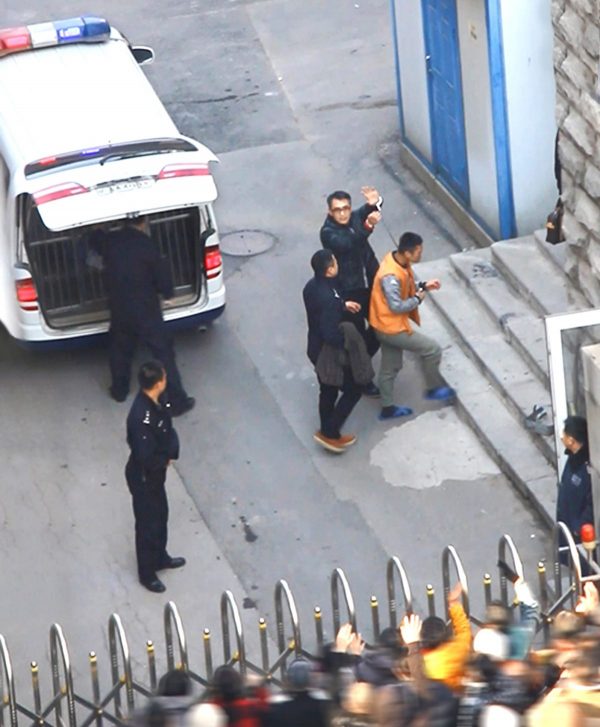
Yu Ming holds up his handcuffed hands and waves as he arrives at the court in Shenyang City on Nov. 20, 2014. (Minghui.org)
A Daring, but Brief, Escape
Yu needed certain items to get his plan off the ground. Due to lax security at the hospital, he managed to get his hands on a cellphone, some cash, and, most importantly, a saw blade.
As many labor camp inmates would often be sent to the hospital and then taken back to the camp, through painstaking communications and complicated calculations, Yu was able to coordinate the escape.
He found people on the outside to come to the two escapees’ aid after they fled the camp, and he found another person to rent a place for them to hide while the police would be searching frantically for them.
The plan was put into action on Aug. 11, 2008. The Games were already in full swing, having begun three days earlier. Using the saw, the iron bars in a cell window were cut and then bent, and the two practitioners slithered down from the third floor using a rope made from a quilt.
Initially, everything went smoothly. They were picked up at the right time and right place by the right people, until … the person who was meant to rent the place for them to stay didn’t show up. Nobody knew what had gone wrong. Yu had to arrange to have his wife, Ma Li, pick up the two escapees and hide them at his home, knowing very well how risky that was.
Three days later, hundreds of policemen, some armed with guns, surrounded the area near Yu’s home and took away the two escapees, as well as Ma.
The escape attempt during the Beijing Olympics from a “model” labor camp infuriated the highest leaders of the communist regime. The escape was classified as a “major incident”; at least seven police officers were fired, and two deputy directors of the camp were punished.
Yu and the two escapees were tortured ferociously.
Yu was hung to a door, with his arms stretched up, and his feet hardly touching the ground. He was hung in this position for over a month, day and night. Sometimes, he could be released when he needed to relieve himself; sometimes, the police wouldn’t release him. So he took as little as possible of the food or water that was pushed into his mouth.
He nearly died.
The other two were tortured more viciously, Yu said. The labor camp was given a two-death quota after the escape try, which meant that two persons could be tortured to death without repercussions.
In addition to being tortured nearly to death, each of the three people involved was given another year at the camp. Sadly for Yu, if he hadn’t planned the escape, he could have been released in about 20 days.
Asked whether the attempt was worthwhile, especially given that it didn’t succeed, Yu replied without hesitation: “Yes, it was.”
“We had to do it,” he said. “More than 10 fellow Falun Gong practitioners around me had already been tortured to death. How could you measure the value of lives? I never regret risking my life to prevent more killings.”
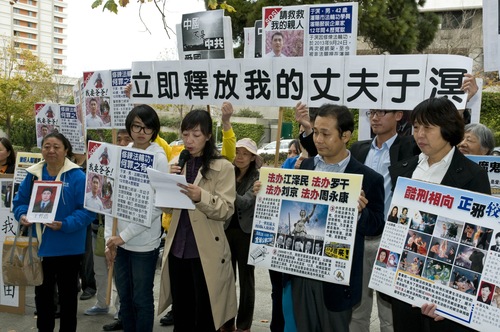
Yu Ming’s wife, Ma Li, and other Falun Gong practitioners protest the re-arrest of Yu and demand his release in front of the Chinese Consulate in San Francisco, Nov. 12, 2013. (Minghui.org)
Finding Freedom in the US
Yu was released in 2017, and at the end of 2018 he escaped to Thailand, where he was able to obtain a visa to the United States. His wife had already gained refugee status from the U.S. government.
On Jan. 27, after nearly 12 years of torture and abuse in China’s prison system, he joined his wife and children in San Francisco.
And he didn’t leave empty-handed.
Before escaping to Thailand, Yu gathered a collection of evidence—ranging from official documents to secret videos recorded on a hidden camera—that give firsthand accounts of the ongoing Falun Gong persecution in China. The evidence also included new information on the “re-education camps” in the Xinjiang region where large numbers of Uighur Muslims are being detained.
Had he been caught with this evidence he would most certainly be back in prison and would likely never see his family again. But he made it and is now doing all he can to help expose the abuses he both suffered and witnessed.
Source: https://www.theepochtimes.com/entrepreneur-risks-life-to-expose-rampant-abuse-at-chinese-labor-camp-during-beijing-olympics_2916124.html
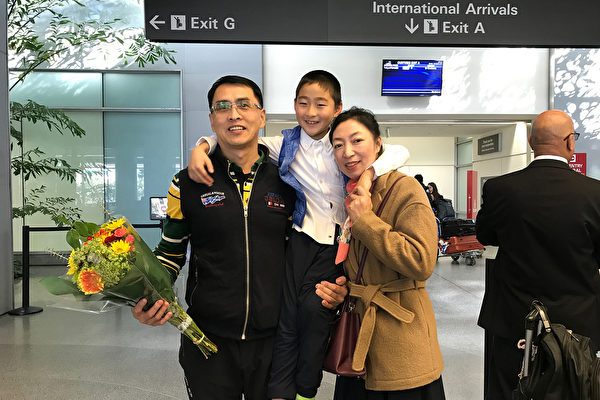
Yu Ming’s wife, Ma Li, and other Falun Gong practitioners protest the re-arrest of Yu and demand his release in front of the Chinese Consulate in San Francisco, Nov. 12, 2013. (Minghui.org)
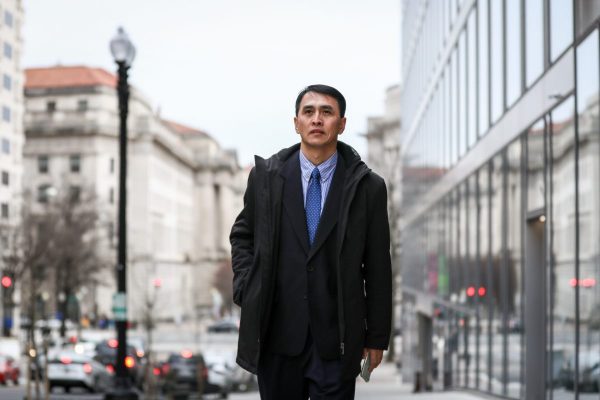
Yu Ming in Washington, D.C., on Feb. 19, 2019. (Samira Bouaou/The Epoch Times)
【新唐人2014年12月07日訊】講述中國人權問題的記錄片《自由中國》在世界各國放映,週五(5日)晚上來到臺北,包括知名作家平路、洪仲丘的舅舅、波蘭駐臺記者瀋漢娜都到場觀看。
《自由中國》預告片:「為十三億中國人,他們渴望自由 思想自由 言論自由 集會自由 信仰自由」
記錄片《自由中國》,描述兩位法輪功學員,在中國所遭受的殘酷對待,揭露中國人權惡況,週五(5日)晚間在臺北放映,新唐人主持人郝毅博以及故事主角曾錚都專程出席。
《自由中國》特映會主持人:「曾錚女士,請站起來跟大家揮手一下」
電影放映廳幾乎爆滿,包括知名作家平路、洪仲丘的舅舅、波蘭駐臺記者瀋漢娜都到場觀看。
台灣國會透明化促進協會胡世和:「生命自由尊嚴還有宗教信仰種族,這些都是基本人權,但是在對岸,應該說在對岸的環境下是遙不可及。」
波蘭駐臺記者瀋漢娜:「不敢置信的故事,我真的很感動,我覺得特別是看這些法輪功學員,那麼勇敢。看他們的勇氣,也覺得他們面對那麼大的迫害,但是還是可以堅守他們的信仰。」
波蘭駐臺記者瀋漢娜開心與故事主角曾錚合影,希望有機會,電影能到波蘭播放。
波蘭駐臺記者瀋漢娜:「我希望很多國家的人,包括我的國家波蘭,可以看這部電影,希望他們可以更了解,這種迫害在中國,到現在還是在發生。」
電影放映結束,還有許多民眾圍著曾錚,想了解更多中國人權問題。
師大學生:「我覺得,如果我們知道這些事情發生,我們不能噤聲。就算我們沒有能力反抗,我們也要說話,讓更多人知道。」
《自由中國》主角曾錚:「中國有沒有自由,有沒有思想的自由,有沒有信仰的自由,他確實是關乎到世界、關乎到台灣香港、關乎到台灣。尤其透過最近的太陽花運動、雨傘運動更多人意識到,那麼反過頭來再來看,自由中國這部電影,能夠引起更多人的共鳴。」
放映會現場,民眾爭相排隊與郝毅博拍照合影,也特別拿起黃色雨傘當道具,用行動聲援香港的雨傘運動。
新唐人亞太電視陳輝堯、張媛婷台灣臺北採訪報導
發表時間: 2014-12-07 12:40 AM
本文網址: http://www.ntdtv.com/xtr/b5/2014/12/07/a1159456.html
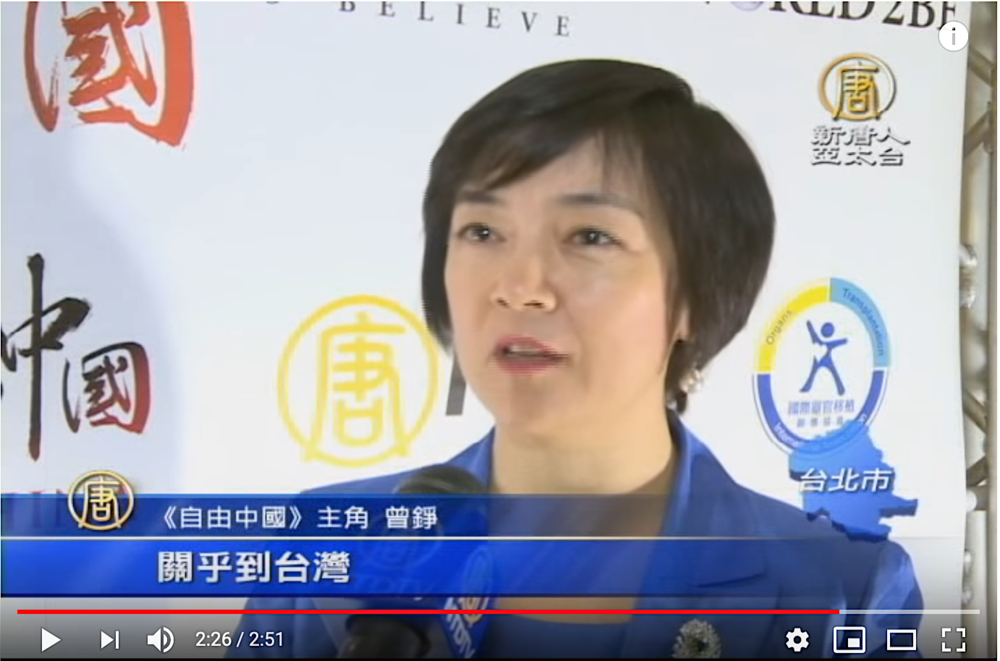
曾錚接受採訪。(圖片來源:新唐人)

曾錚與波蘭駐臺記者瀋漢娜合影。(圖片來源:新唐人)
【新唐人2012年12月28日訊】一封藏在萬聖節飾品盒中來自中國遼寧馬三家教養院密信震撼了視強制勞動為非法的美國社會。 對馬三家教養院的倖存者、原大連臨床內科主治醫師潘奇來講,奴工勞動只是馬三家殘酷迫害的一部分,更可怕的是,不放棄信仰的法輪功學員學員,包括她自己, 被強灌精神病藥物,至少有三十多名法輪功學員在馬三家被迫害致精神失常。
據明慧網的不完全統計,到2010年4月,至少有三十多名法輪功學員被迫害致精神失常,還不包括被迫害至精神崩潰在馬三家死亡的。潘奇曾親眼見過已經死於2006年的法輪功學員蘇菊珍被強灌精神病藥物後的慘狀。
馬三家倖存者、原大連臨床內科主治醫師潘奇:「她的兩個眼睛直直的、直直的看著我,沒有任何表情,我就說,你怎麼了?她也不看我,就像沒有了靈魂,她不認識我了,我就掐了她一下,我說,你快看看哪,你看看我是誰呀。」
不久之後,同樣的命運落到潘奇頭上。
馬 三家倖存者、原大連臨床內科主治醫師潘奇:「到那個醫院吧,他就說,你沒轉化吧,我說,修煉是正確的,我沒有病,他說,沒轉化,就是精神病……幾個人,就 把我壓在一個床板上,其中一個人拿一個杓子,把那個藥,我記得那是藍色的,天藍色的膠囊 ,裡面裝著黑色的粉末,把它放在藥匙裡,羹匙裡,攪均了以後,然後捏著你的鼻子,喘不上氣的時候,一下子就灌進去。」
勞教所為迫使法輪功學員放棄信仰,還使用了最令修煉人痛苦的手段。
馬三家倖存者、原大連臨床內科主治醫師潘奇:「他們就把師父的照片放在地上,然後就把我抬起來,壓著師父的照片,踩著我的手,踩著我的腳,踩著我的身子,我 哪個地方要往起起,就踩著哪個地方,然後就說,要轉化,然後他們就用了電棍……我不想面對這一切,其實我是不想面對他們對師父的侮辱,這個事情是不能做 的……。」
由於拒絕轉化,潘奇被延期關押,被迫害至精神恍惚後,才由家人以有精神病為名保釋出去。後經泰國輾轉來到美國。
新唐人記者曾錚紐約報導
2012-12-28 08:54:05
http://www.ntdtv.com/xtr/b5/2012/12/28/a821671.html.-馬三家倖存者-震撼揭露「被精神病」.html
May 13, 2019 Updated: May 13, 2019
WASHINGTON—After a House hearing on U.S.–China relations on May 8, Rep. Scott Perry (R-Pa.) said that not only are tariffs on Chinese goods necessary, but sanctions and punishments are long overdue.
Speaking after the hearing “Smart Competition: Adapting U.S. Strategy Toward China at 40 Years,” Perry said he hopes to work with other House members on bipartisan legislation regarding relations with China.
He said that although many ordinary Chinese people are capitalistic and embrace many Western values, the United States isn’t dealing with those people on decision-making levels; what the United States is dealing with is the oppressive Chinese communist regime.
“So it starts out with how we characterize them,” he said.
Perry said sanctions and punishments—and not tariffs—are what’s needed with regard to what the Chinese communist regime has been doing, such as undermining U.S. sanctions over North Korea, stealing U.S. technology, and other actions.
“It is time now to sanction China, which is to punish. Not just tariffs, but to punish. To punish for their malign activities,” he said.
“It’s long overdue. I understand that China has been given a long leash over many, many years now, to do the things that they’ve done. And this president has worked diligently on a reasonable time frame to say, ‘Hey, there’s a new sheriff in town. We’re no longer going to put up with this abuse of sending fentanyl into our country, stealing our property, taking our jobs.’”
Perry said the United States must show China that “we are serious about that. ”
“First of all, we should have reciprocity on visas from China. We should have the same freedom of movement in China that Chinese visa recipients have in the United States of America. That’s an easy number one,” he said.
“Number two, China can no longer be allowed to wash their dirty money from illicit activities in American banks and the American financial system. The first thing begins with penalties. The second phase would be a lack of access to financial markets in the United States. The American people and the American taxpayer shouldn’t be supporting malign Chinese activities.”
Perry said the United States shouldn’t tolerate human rights violations in China, either.
“Once again, America has to be that beacon on the hill of freedom,” he said. “You give them a reasonable amount of time to be good neighbors and a good host to the people in their country. But when they fail to comply, and have no interest in compliance, you have to seek other methods.”
Perry said that based on what was said during the hearing, representatives from the Democratic Party are also interested in imposing sanctions on China.
“I’ve seen very affirmatively that there are friends on the other side that are interested in the same things that our side is interested in. I think there’s an opportunity here, in a time of little bipartisanship, to work on something collaboratively, and send that to the president. So I’m encouraged by that. Now, I’m going to have a conversation with some of these members today,” he said.
Perry said that the trade talk with China was very “tough,” but signals must be sent.
“I am not a fan of tariffs. China has to understand that America is going to assert its economic independence in this regard. We are not to be taken advantage of.”
President Donald Trump has given China enough time to transition to a new way of doing things, Perry said. “Let’s be clear. No president other than this one has attempted this in the past. If you’re China, you say, well, they’re not serious about it. They’ve never done it before. And they really don’t like the tariffs. They’re hard on their business. And China is going to try to wait us out. So, I think they’re making a mistake.”
Perry said he hopes that the president will ensure, by increasing the pressure, that the Chinese know that they’re making a mistake. And the United States must be prepared to implement punishments and enforcement, he added.
Source: https://www.theepochtimes.com/us-rep-scott-perry-calls-for-punishing-china-for-malign-activities_2920410.html

Rep. Scott Perry (R-Pa.) at the House hearing on “Smart Competition: Adapting U.S. Strategy Toward China at 40 Years” on Capitol Hill on May 8, 2019. (Jennifer Zeng/The Epoch Times)
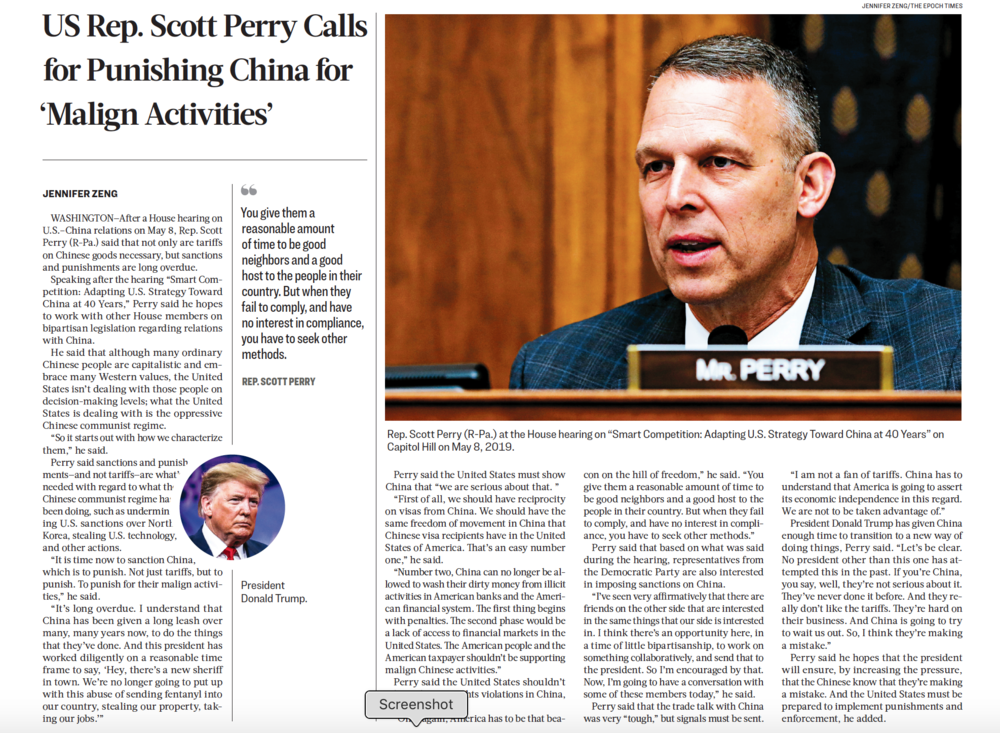
Print version of the article.
【新唐人2012年12月27日訊】一封來自中國遼寧馬三家教養院的密信,在穿越了千山萬水後到達了美國俄勒岡居民朱麗葉‧凱 斯(Julie Keith)的手中,密信的內容是向國際社會呼救。美國聯邦移民海關執法局下屬的國土安全調查部門已對此展開調查。出售這個萬聖節飾品的Kmart公司也 發表聲明說,一旦發現中國合作公司使用強制勞動,將終止合同。那麼,馬三家教養院的倖存者,又是怎樣看待這封信的呢?
法輪功學員潘奇自99年10起被關馬三家教養院共一年零四個月。
馬三家倖存者法輪功學員潘奇:「我就是感同身受,就是因為我也曾經被關押在馬三家勞教所裡,也被強迫做奴工,他在這封信裡邊所說的那些裝飾品啊,還有萬聖節的一些禮品啊,都是我曾經做過的。」
「我們還繡過花,穿珠子,再就是做過一些聖誕的裝飾品,確實說了是出口的。」
「有很多人啊,就是因為成宿的幹活,或勞累啊,我看他們不動了,過去一看,他們睡過去了。」
「因為幹那個活是運動的,比如說跑機器的時候,有的人就會把手指頭放在機頭下,然後一下扎進去了,我就看見已經出血了,但是他把手包一包,繼續干,沒有人允許你停下來。當時我走路的時候,我就感覺自己一閉眼睛就睡過去了。」
「很軟的棉絮啊,但是經常摩擦你的皮膚,就會把皮膚磨破了,然後主要是從手腕這個地方開始破皮,然後變黑,然後整個手從這個地方到這個地方,整個皮膚全都不見了,看不到皮膚了,全部都黑掉,壞了。」
「我們沒有拿到任何的錢,而且我們不僅沒有錢,如果說機器,剪刀,任何麵料有丟失的,他還要我們補給他錢。」
「完不成任務,他讓你不吃飯,蹲著,撅著,開飛機啊,或者是用電棍。很多人在那裏邊甚至自殺呀,或者自傷,自殘,都是被逼的。」
新唐人記者曾錚紐約報導
2012-12-27 10:00:04
http://www.ntdtv.com/xtr/b5/2012/12/27/a821054.html.-馬三家倖存者談萬聖節飾品盒密信.html
【新唐人2014年12月10日訊】榮獲多項影展大獎的記錄片《自由中國:有勇氣相信》日前在台灣高雄放映,吸引多位民團領袖等400多位觀眾到場。
選在世界自由日前夕,《自由中國:有勇氣相信》在高雄播映,真人真事,讓400多位觀眾,感受震撼。
主婦聯盟綠繪本召集人王南琦:「中共這麼大的政權,我們怎麼能夠去對抗它,可是剛剛最後女主角曾錚說了,只要我們能夠讓這訊息傳播出去,讓更多中國朋友可以看到、可以了解說,其實中共這個政權是一個很不人道的政權,然後他們受到的迫害在全世界其他地區是絕對沒有的,我們可以讓中國人民自己覺醒的話,這是一條可行的路。」
陳文成博士紀念基金會董事陳玉霖:「第一個了解就是說,法輪功受迫害是事實、是存在的。第二個就是說,法輪功學員被迫害,然後跟活摘器官連結,所以這個中共確實是一個很可怕的政權組織。」
影片講述,中國法輪功學員,因為堅持真善忍,就被投入牢房、承受酷刑、奴役,觀眾反思,15年來,台灣民眾對制止中共迫害,做了甚麼?
綠黨高雄市議員參選人梁益誌:「今天看完這部電影之後,第一個思考就是我們年輕人的自覺,一直以來我們都沒有好好去思考,台灣跟中國之間的關係,這樣的惡鄰居到底做了甚麼事情,它的所作所為是甚麼。」
漫畫家蔡宗芸:「因為常在台灣街頭看到很多法輪大法的學員,他們努力在跟中國人還有台灣人傳達他們的訊息,我覺得這部電影闡述得非常完整,而且非常感動人,非常好,我滿建議看的人能傳播給更多人知道,我也會在自己的粉絲頁上,讓更多人關注這件事情。」
60分鐘記錄片,彙集正義力量,許多觀眾還在現場撐傘合照,希望把這股認清中共本質的聲浪,也傳達給爭取真普選的香港民眾 。
新唐人亞太電視李涓榕、林宏觀台灣高雄採訪報導
轉載自:https://www.ntdtv.com/b5/2014/12/10/a1160285.html
【新唐人2012年11月11日訊】11月10號,新唐人2012年第四屆「全球華人攝影作品大獎賽」在美國紐約曼哈頓的卡魯 麥特畫廊舉行了評選結果揭曉及獲獎作品展開展儀式。展出的78幅作品是從七千多幅參賽作品中脫穎而出的佼佼者。大賽評委主席戴兵表示,這是華人世界中水準 最高的一次大賽。
新唐人第四屆「新唐人全球華人攝影作品大獎賽」吸引了來自42個國家的1760名華人選手參加,參賽作品共7158幅。大賽評委主席戴兵表示,這次參賽作品質量普遍很高,要篩選出優秀作品很不容易。
攝影大賽評委主席戴兵:「其實在評選中真的是很難,我們通過了幾次的篩選。」
戴兵還表示,從大賽的規模和作品水平看,新唐人的大賽,是華人世界中水平最高的。
攝影大賽評委主席戴兵:「我們這次比賽在華人世界裡是最高水準的一次比賽。」
新唐人副總裁周世雨:「新唐人的攝影大賽,除了促進華人攝影師、攝影看好者之間的文化交流之外,很主要的是在提倡和恢復傳統美學的形式和理念,因為我們覺得 這是人類文化遺產中最精華的一個部分,作為新唐人的攝影展,它所提倡的,所要求攝影師要表達的,是人類社會中的這種善意,美好、光明,還有它的自然的狀 態。」
作品展的觀眾表示,新唐人攝影大賽的作品水準很高,具有強烈的藝術震撼力。
曼哈頓卡魯麥特畫廊副經理Steven Kay:「我很喜歡這些作品,能看到來自全世界的作品,表現不同的文化,雖然使用的是現代的技術,但表達的畫面卻是古老的,顯示攝影師們仍然能理解和欣賞攝影這門藝術。」
電臺節目主持人Simon Applebaum:「這次大賽很了不起,大賽作品捕捉到的都是最美的瞬間。」
Lotus Editions雜誌作家、攝影師Stephen Wise:「我們的社會從視覺上說已經飽和了,你很難再被一幅圖畫打動,但這些作品都很優秀,每一幅背後都有一個故事,非常有震撼力,我自己也是攝影師,我被這些作品深深打動。」
百里挑一的作品,將在此展出到11月25號。喜歡攝影作品的觀眾朋友,請千萬不要錯過這次機會。
新唐人記者曾錚紐約報導
2012-11-11 10:18:05
轉載自:
http://www.ntdtv.com/xtr/b5/2012/11/11/a795359.html.-新唐人攝影賽作品展-評委讚水準最高.html

新唐人電視台舉辦的第四屆全球華人攝影作品大獎賽風光自然類銅獎作品《漁夫》(攝影:蘇瑋岷/馬來西亞)
Summer Time 夏日
Jennifer at Central Park in New York on June 29, 2017. Photo by Benny Zhang. 曾錚2017年6月29日攝於紐約中央公園。攝影:張炳乾。